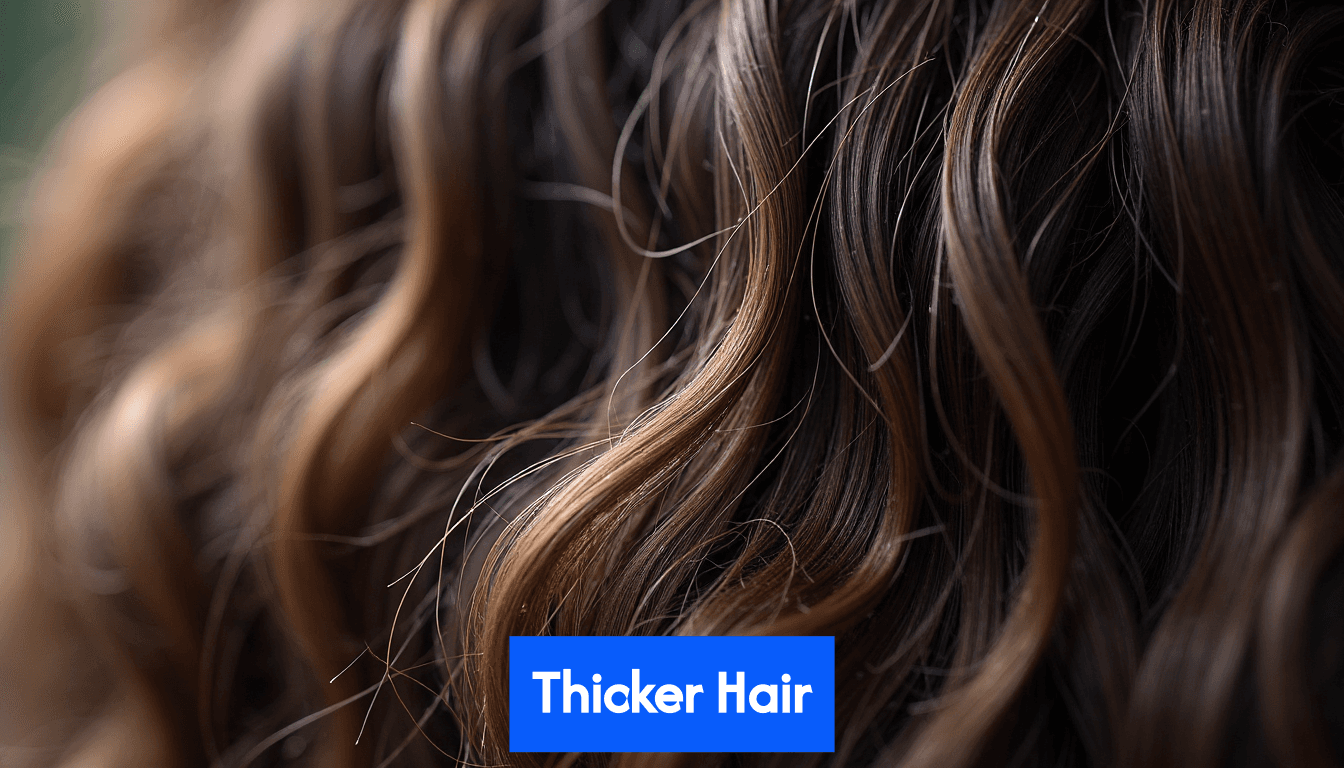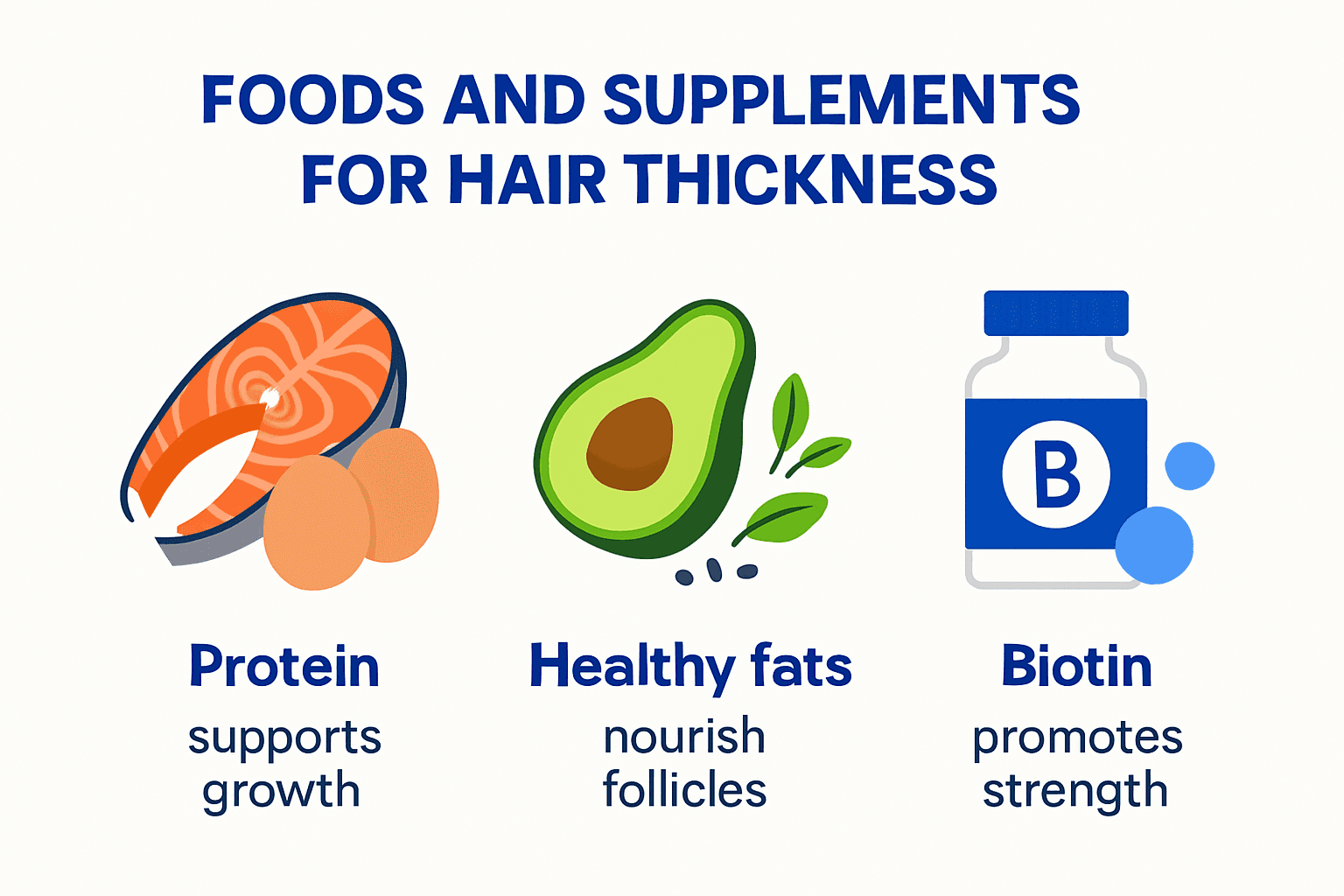Blog
Learning Materials
How to Make Hair Thicker in 2025: Tips and Tricks
Updated: May 26, 2025

Achieving thicker, fuller hair might seem like a distant dream for many, but the reality is closer than you think. With over statistically, over 50% of women experience hair thinning at some point in their lives, understanding the right strategies is crucial. However, here's the twist: it's not just about products and treatments. The game-changer lies within your daily habits and choices. By tapping into the power of nutrition, natural remedies, and lifestyle adjustments, you can unlock the secret to hair that looks and feels thick and healthy. Get ready to transform your hair journey.
Table of Contents
- Natural Ways To Get Thicker Hair
- Lifestyle Changes For Thicker Hair
- Do's And Don'ts For Thicker Hair
Quick Summary
| Takeaway | Explanation |
|---|---|
| Nutritional Focus | Incorporate protein-rich foods, omega-3 fatty acids, and essential vitamins into your diet to promote hair thickness from within. |
| Natural Treatments | Utilize herbal remedies like rosemary and peppermint oils to stimulate hair growth and enhance thickness naturally. |
| Lifestyle Adjustments | Manage stress through mindfulness practices and ensure adequate sleep to support optimal hair health and thickness. |
| Protective Practices | Implement gentle hair care techniques, like regular trims and hydration, while avoiding tight hairstyles and excessive heat treatments to minimize damage. |
| Seek Professional Advice | Consult a trichologist or dermatologist for personalized assessments and tailored strategies for persistent hair thinning issues. |
Natural Ways to Get Thicker Hair
Achieving thicker, fuller hair doesn't always require expensive treatments or medical interventions. Natural approaches can significantly improve hair density and strength, offering hope for those struggling with thin or lackluster hair. Understanding the right techniques and ingredients can transform your hair's appearance and health.
Nutritional Strategies for Hair Thickness
Your diet plays a crucial role in how to make hair thicker. Protein is the fundamental building block of hair, with keratin being the primary structural component. Incorporating foods rich in biotin, iron, and omega-3 fatty acids can dramatically improve hair growth and thickness. Nutritional powerhouses like eggs, salmon, spinach, and nuts provide essential nutrients that support robust hair development.
The National Institutes of Health confirms that nutritional deficiencies can directly impact hair growth. Zinc, for instance, helps repair and grow hair tissue, while vitamin D receptors in hair follicles suggest its importance in the hair growth cycle. A targeted diet can essentially act as a natural way to thicken hair from the inside out.
Herbal and Natural Treatments
Several natural ingredients have shown promising results in promoting thicker hair. Research published in Scientific Reports highlights the potential of botanical extracts in hair growth. Red ginseng oil, for example, has demonstrated remarkable capabilities in stimulating hair follicle activity. According to the study, it upregulates essential growth factors that can help make hair thicker by increasing follicle size and number.
Other powerful natural treatments include:
- Rosemary oil: Shown to be as effective as minoxidil in promoting hair growth
- Peppermint oil: Increases circulation to the scalp
- Aloe vera: Soothes the scalp and provides essential nutrients
Lifestyle and Hair Care Techniques
How you treat your hair daily significantly impacts its thickness. Gentle handling is key to preventing breakage and promoting stronger growth. Avoid tight hairstyles that strain hair follicles, and use a wide-toothed comb to detangle wet hair. Scalp massage can stimulate blood circulation, potentially encouraging thicker hair growth by activating dormant follicles.
Hydration is another critical factor in how to get thicker hair. Drinking adequate water and using moisture-rich hair products can prevent brittleness and support overall hair health. Dermatology experts recommend protecting hair from heat damage and minimizing chemical treatments that can weaken hair structure.
Understanding that hair thickness is a combination of genetics, nutrition, and care can empower individuals to take proactive steps. While results vary, consistent application of these natural approaches can yield noticeable improvements in hair density and overall hair health. Patient, holistic care remains the most effective strategy for those seeking to thicken their hair naturally.
Lifestyle Changes for Thicker Hair
Thicker hair isn't just about products or treatments; it's deeply connected to your overall lifestyle and daily habits. Making strategic changes can significantly impact hair health, density, and growth potential. Understanding how everyday choices influence hair thickness empowers individuals to take control of their hair's appearance and strength.
Stress Management and Hair Health
Stress represents a critical yet often overlooked factor in hair thickness. Chronic stress triggers hormonal imbalances that can lead to increased hair shedding and reduced hair growth. Research from the National Institutes of Health demonstrates that elevated cortisol levels directly correlate with telogen effluvium, a condition causing significant hair thinning.
Effective stress reduction techniques can help mitigate hair loss and promote thicker hair growth. Mindfulness practices like meditation, yoga, and regular deep breathing exercises can lower cortisol levels and create a more balanced internal environment. Implementing just 15-20 minutes of stress management activities daily can yield remarkable improvements in hair health.
Nutritional Supplementation and Diet Optimization
A targeted approach to nutrition can transform hair thickness from within. A randomized clinical study published in the Journal of Clinical and Aesthetic Dermatology revealed that daily dietary supplementation containing B vitamins, zinc, and botanical ingredients led to a statistically significant 10.1% increase in hair growth density over six months.

Key dietary recommendations for thicker hair include:
- Protein-rich foods: Eggs, lean meats, and legumes
- Omega-3 sources: Salmon, chia seeds, and walnuts
- Iron-packed vegetables: Spinach, kale, and broccoli
Consider consulting a nutritionist to develop a personalized dietary plan that supports hair thickness and overall health. Targeted supplementation can fill nutritional gaps that might be hindering optimal hair growth.

Sleep and Recovery Strategies
Quality sleep plays a crucial role in hair regeneration and thickness. During deep sleep stages, the body repairs and regenerates tissues, including hair follicles. Sleep researchers at Stanford University emphasize that consistent, quality sleep is essential for hormonal balance and cellular repair.
To optimize hair health through sleep, establish a consistent sleep schedule, aim for 7-9 hours nightly, and create a relaxing bedtime routine. Avoid electronic devices before sleep, maintain a cool bedroom temperature, and use comfortable bedding. These practices not only support overall health but can contribute to thicker, more resilient hair.
Transforming hair thickness requires a holistic approach that extends beyond topical treatments. By managing stress, optimizing nutrition, and prioritizing rest, individuals can create an internal environment that naturally supports robust, thicker hair growth. Patience and consistency are key—meaningful changes in hair thickness typically become noticeable after 3-6 months of dedicated lifestyle modifications.
Do's and Don'ts for Thicker Hair
Navigating the path to thicker hair requires a strategic approach that balances protective practices with proactive hair care techniques. Understanding what to do and what to avoid can significantly impact hair density, strength, and overall health. This comprehensive guide will help you make informed decisions about maintaining and improving your hair's thickness.
The Do's of Hair Thickness
Successful hair thickness management begins with positive, scientifically-backed practices. Researchers from the University of Virginia have discovered a critical population of stem cells in hair follicles that play a crucial role in hair growth. Protecting these delicate cells becomes paramount in maintaining hair thickness.
Key positive practices include:
- Gentle scalp massage: Stimulates blood circulation and activates hair follicles
- Regular trimming: Removes split ends and prevents breakage
- Protective nighttime routines: Use silk pillowcases and loose hair ties to minimize friction
- Consistent hydration: Drink plenty of water and use moisture-rich hair products
Additionally, clinical research suggests that hair thinning is not an inevitable process. By implementing targeted care strategies, individuals can support their hair's natural growth potential and maintain follicle health.
The Don'ts to Avoid
Certain practices can significantly compromise hair thickness and overall hair health. Avoiding these common mistakes is crucial for maintaining robust, dense hair. Excessive heat styling, harsh chemical treatments, and aggressive hair handling can deplete the critical stem cells responsible for hair growth.
Practices to strictly avoid include:
- Tight hairstyles: Ponytails and braids that pull on the scalp
- Excessive heat styling: Frequent use of flat irons and high-heat blow-drying
- Chemical overprocessing: Repeated bleaching, perming, or harsh coloring
- Rough towel drying: Causes unnecessary breakage and stress to hair strands
Professional Guidance and Advanced Considerations
While personal care is essential, professional intervention can provide more advanced solutions for hair thickness. Emerging clinical trials in Japan are exploring innovative treatments using a patient's own stem cells to improve hair density, highlighting the potential for personalized hair restoration strategies.
Consider consulting a trichologist or dermatology specialist if you experience persistent hair thinning. These professionals can:
- Conduct comprehensive scalp assessments
- Identify underlying health conditions
- Recommend targeted treatments
- Provide personalized hair care strategies
Understanding that hair thickness is a complex interplay of genetics, nutrition, care practices, and overall health empowers individuals to take a holistic approach. Patience is key—meaningful improvements in hair thickness typically require consistent care over several months. By implementing these do's and avoiding the don'ts, you can create an optimal environment for thicker, healthier hair growth.
Frequently Asked Questions
What are some natural ways to make hair thicker?
Incorporate protein-rich foods, omega-3 fatty acids, and vitamins into your diet. Natural treatments such as rosemary and peppermint oils can also stimulate hair growth and enhance thickness.
How does stress affect hair thickness?
Chronic stress can lead to hormonal imbalances and increased hair shedding. Engaging in mindfulness practices like meditation and yoga can help manage stress and promote hair health.
What lifestyle changes can help improve hair thickness?
Focus on a balanced diet rich in protein and essential nutrients, practice stress management techniques, and ensure adequate sleep. Regular trims and gentle hair care practices can also benefit hair thickness.
Should I consult a professional for hair thinning issues?
Yes, consulting a trichologist or dermatologist can provide personalized assessments and targeted strategies for persistent hair thinning. They can help identify underlying conditions and recommend effective treatments.
Unlock Thicker Hair with Personalized Insights from MyHair.ai
Feeling overwhelmed by thinning hair? You're not alone. Many individuals struggle with achieving the thicker, fuller locks they desire—and the journey can be frustrating. The article you just read emphasizes the importance of nutrition, lifestyle adjustments, and natural treatments to enhance hair thickness. But what if your solution was just a scan away?

At MyHair.ai, we take a personalized approach to address your unique hair challenges. Our AI-based analysis not only identifies your specific patterns of hair health but also provides tailored growth projections and product recommendations designed to help you maximize thickness over time. Picture tracking your hair’s improvement week by week—transforming your hair journey with actionable insights.
Don’t wait! Start your journey to revitalized hair today. Visit https://myhair.ai and unlock the secrets to healthier hair. Act now and embrace the hair transformation you’ve always dreamed of!